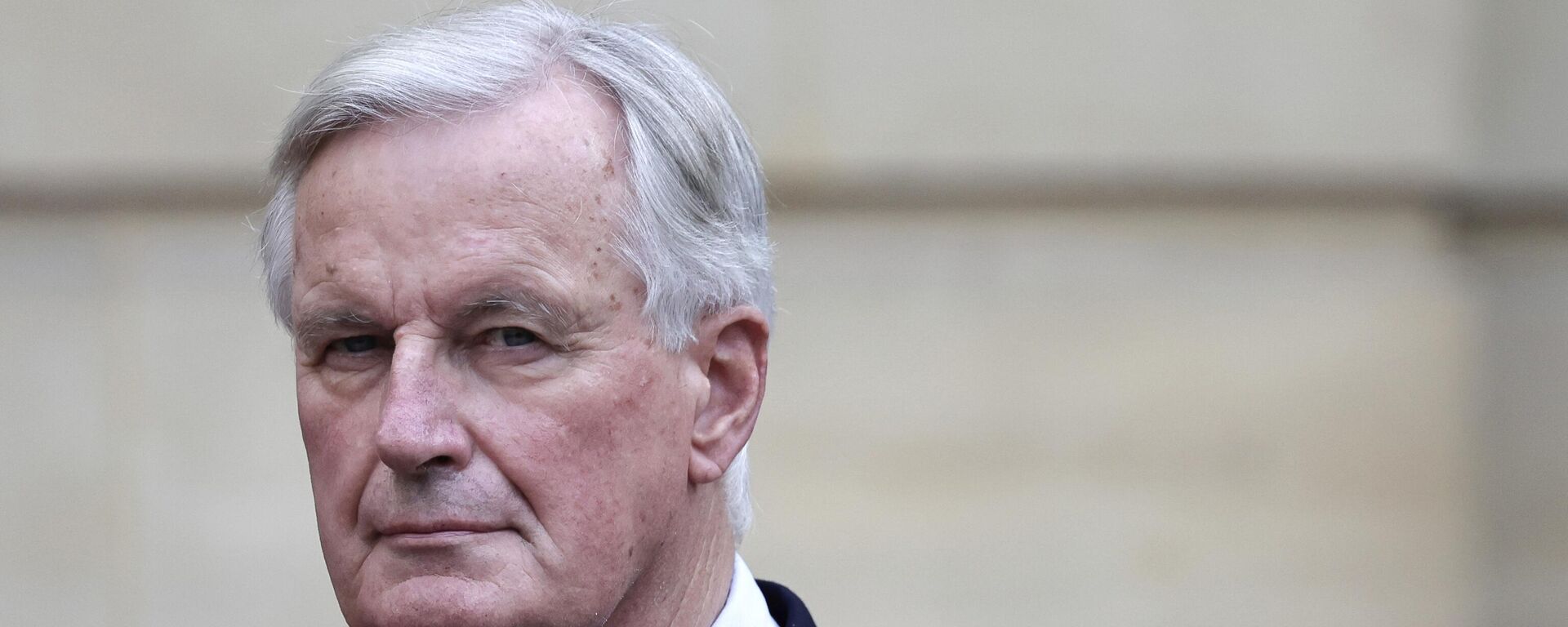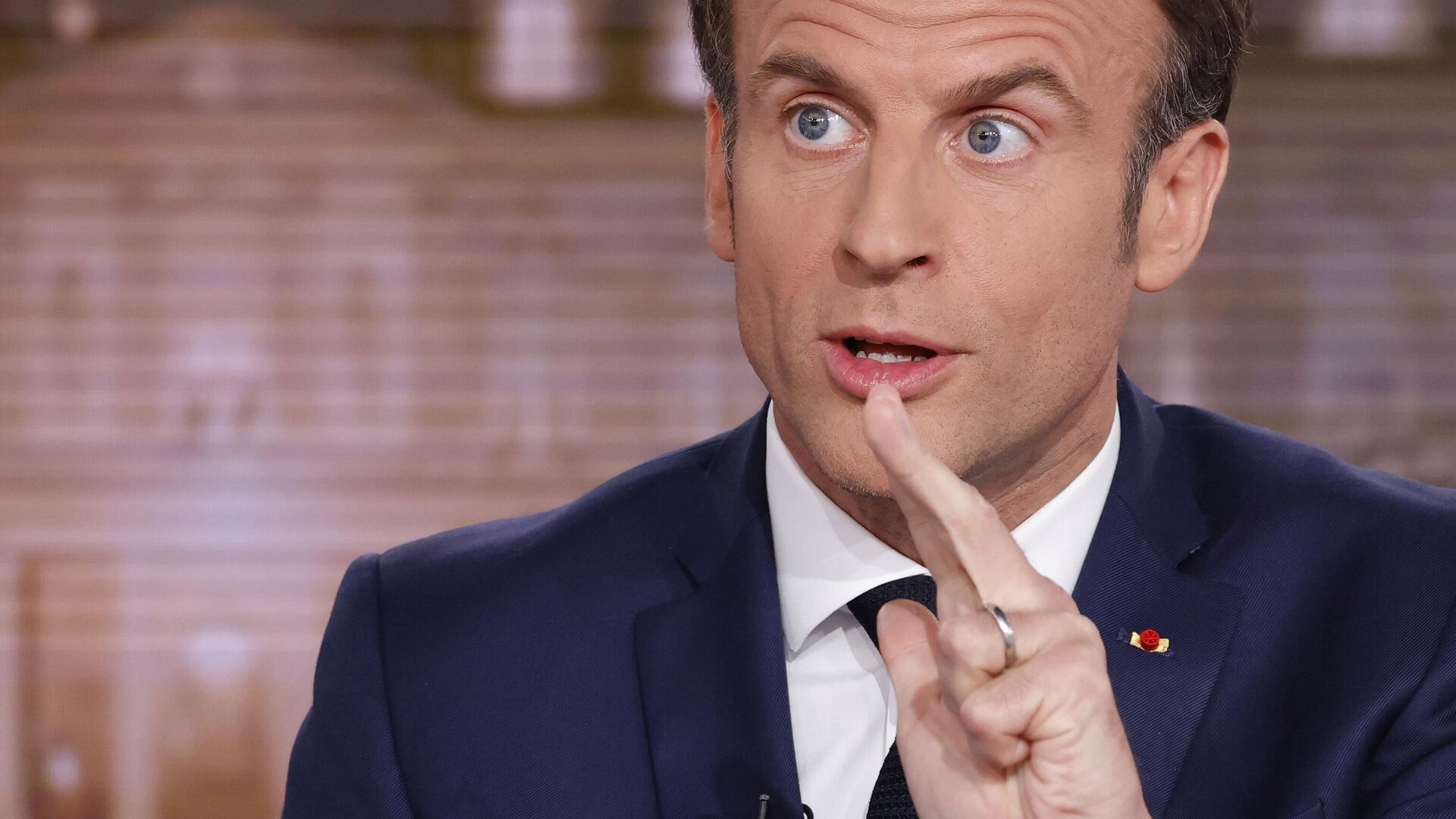https://sputnikglobe.com/20240906/how-macron-played-the-populists-1120062254.html
How Macron Played the Populists
How Macron Played the Populists
Sputnik International
Emmanuel Macron managed to secure a prime minister without resorting to appointing one from the populist left that allied with his coalition to stop the populist right.
2024-09-06T22:34+0000
2024-09-06T22:34+0000
2024-09-07T00:33+0000
world
michel barnier
george szamuely
france
emmanuel macron
europe
new popular front (nouveau front populaire)
national rally
european union (eu)
https://cdn1.img.sputnikglobe.com/img/07e8/05/1d/1118672801_0:0:3072:1728_1920x0_80_0_0_5eb8e1c298b96c7ddaa0303af40dd2ec.jpg
The French New Popular Front is learning the consequences of working with centrists and neoliberals after allying with Macron’s Ensemble coalition to stop the National Rally. On Thursday, Macron named Michel Barnier as France's new prime minister. A conservative from the Gaullist party, which came in a distant fourth place in this summer’s parliamentary elections, Barnier is best known as the EU negotiator for Brexit.To secure the new government, it is widely suspected that Macron brokered a deal with the National Rally to secure their support and prevent a no-confidence vote by the New Popular Front.While the New Popular Front won the most seats in the election, they did not secure a majority that would’ve given them enough leverage to demand the prime minister of their choosing. Still, it was largely assumed that the new prime minister would come from the largest party, rather than an increasingly irrelevant conservative political party.To summarize, Macron allied with the National Rally, the same group his former prime minister said needed to be stopped at all costs, rather than appoint a prime minister from the party that helped him stop it. Macron’s argument is that a prime minister from the New Popular Front would not survive a vote of no confidence, but that is only true if Macron’s party supported the motion.In the French system, the prime minister is appointed by the president. The prime minister is then tasked with proposing ministers to fill the government, pending approval from the President. At any time during a national assembly, the parliament can call for a vote of no-confidence of the government. If the majority of parliament approves of the motion, then the president is forced to appoint a new prime minister and the process begins anew.The aggrieved New Popular Front has promised to call for a no-confidence vote. However, the National Rally has pledged conditional support pending the government policy statement that Barnier is expected to give parliament.Two weeks ago, Macron held talks with the New Popular Front after he rejected their prime minister candidate Lucie Castets. Representatives from the left said they were “extremely satisfied” with Macron's direction and Manuel Bompard of the French Unbowed party (part of the New Popular Front coalition) said the French president was learning that he needed to act as “a referee… not a selector,” in the process.However, two days later, Macron met with members of the National Rally to discuss how he could gain their support, which he apparently did, if not at that meeting then a subsequent one.Essentially, Macron worked with the left-wing populists to stop the right-wing populists, and now he is working with the right-wing populists to stop the left-wing populists. In doing so, Macron is handing leverage to Le Pen to form the next government and shape policy. Macron will usher in a right-wing immigration policy to ensure the French retirement age remains elevated.Furthermore, by allowing the National Rally to take part in government, it will give Le Pen more legitimacy, potentially helping her presumed 2027 campaign for President.Left unasked by Szamuely: will the populist left come to the centrists' rescue again in 2027, after being burned so thoroughly in 2024?
https://sputnikglobe.com/20240906/where-does-newly-appointed-french-pm-michel-barnier-stand-on-key-issues-1120056743.html
france
Sputnik International
feedback@sputniknews.com
+74956456601
MIA „Rossiya Segodnya“
2024
News
en_EN
Sputnik International
feedback@sputniknews.com
+74956456601
MIA „Rossiya Segodnya“
Sputnik International
feedback@sputniknews.com
+74956456601
MIA „Rossiya Segodnya“
french prime minister, macron ignoring democracy, how did macron appoint barnier
french prime minister, macron ignoring democracy, how did macron appoint barnier
How Macron Played the Populists
22:34 GMT 06.09.2024 (Updated: 00:33 GMT 07.09.2024) On July 7, the leftist coalition, the New Popular Front, collaborated with French President Emmanuel Macron’s coalition to defeat the National Rally party by agreeing to pull their weaker candidates during the second round of voting. The plan worked, with the National Rally securing the third most seats, despite receiving the most overall votes.
The French New Popular Front is learning the consequences of working with centrists and neoliberals after allying with Macron’s Ensemble coalition to stop the National Rally. On Thursday, Macron named Michel Barnier as France's new prime minister. A conservative from the Gaullist party, which came in a distant fourth place in this summer’s parliamentary elections, Barnier is best known as the EU negotiator for Brexit.
To secure the new government, it is widely suspected that Macron brokered a deal with the National Rally to secure their support and prevent a no-confidence vote by the New Popular Front.
While the New Popular Front won the most seats in the election, they did not secure a majority that would’ve given them enough leverage to demand the prime minister of their choosing. Still, it was largely assumed that the new prime minister would come from the largest party, rather than an increasingly irrelevant conservative political party.
To summarize, Macron allied with the National Rally, the same group his former prime minister said needed to be stopped at all costs, rather than appoint a prime minister from the party that helped him stop it. Macron’s argument is that a prime minister from the New Popular Front would not survive a vote of no confidence, but that is only true if Macron’s party supported the motion.
“[Macron] wants to maintain his legacy as basically a neoliberal, because the condition that [The New Popular Front] would insist on… Is to return the retirement age back from 64 to 62,” explained Dr. George Szamuely, a senior research fellow at the Global Policy Institute and author of Bombs for Peace: NATO’s Humanitarian War on Yugoslavia on Sputnik’s Fault Lines, noting earlier that Barnier is “a fully paid up member of the French political elite.”
In the French system, the prime minister is appointed by the president. The prime minister is then tasked with proposing ministers to fill the government, pending approval from the President. At any time during a national assembly, the parliament can call for a vote of no-confidence of the government. If the majority of parliament approves of the motion, then the president is forced to appoint a new prime minister and the process begins anew.
The aggrieved New Popular Front has promised to call for a no-confidence vote. However, the National Rally has pledged conditional support pending the government policy statement that Barnier is expected to give parliament.

6 September 2024, 17:36 GMT
Two weeks ago, Macron
held talks with the New Popular Front after he rejected their prime minister candidate Lucie Castets. Representatives from the left said they were
“extremely satisfied” with Macron's direction and Manuel Bompard of the French Unbowed party (part of the New Popular Front coalition) said the French president was learning that he needed to act as
“a referee… not a selector,” in the process.
However, two days later, Macron met with members of the National Rally to discuss how he could gain their support, which he apparently did, if not at that meeting then a subsequent one.
“I think [Macron’s concession to the National Rally] would have to be some serious controls on immigration… he has to make some kind of pledge that illegals will be deported and no more [of the] interminable appeals after appeal after appeal. And that any migrants will be turned away at the border, something like that,” Szamuely surmised. “Once you go down that path, you do come into conflict with the EU. And that’s very much a serious question as to whether the EU would tolerate France really cracking down on illegal migration. But, that would have to be the most important consideration for [National Rally Leader Marine] Le Pen.”
Essentially, Macron worked with the left-wing populists to stop the right-wing populists, and now he is working with the right-wing populists to stop the left-wing populists. In doing so, Macron is handing leverage to Le Pen to form the next government and shape policy. Macron will usher in a right-wing immigration policy to ensure the French retirement age remains elevated.
Furthermore, by allowing the National Rally to take part in government, it will give Le Pen more legitimacy, potentially helping her presumed 2027 campaign for President.
“That’s what [Le Pen] is thinking about. At this stage, she may well think that being a kind of responsible part of the government… and allowing a government to govern would add to her credibility as a candidate for 2027,” explained Szamuely. “The question is, who takes over from Macron as the leading centrist candidate?”
Left unasked by Szamuely: will the populist left come to the centrists' rescue again in 2027, after being burned so thoroughly in 2024?



